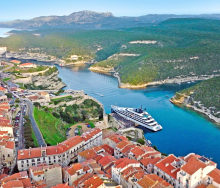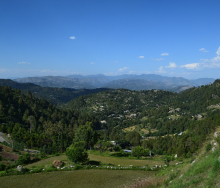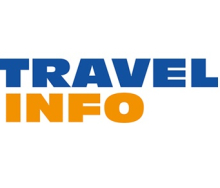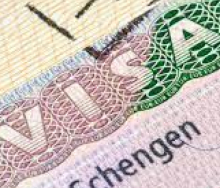Deal or no deal? Post-Brexit travel outlook uncertain
AS POLITICAL
uncertainty continues
around the UK’s
planned departure from
the EU on March 29, tour
operators report increasing
concern amongst clients
as to what Brexit will mean
for their future holidays to
Europe.
Travel companies have
begun preparing for a hard
Brexit. “Most important to
remember at the moment, is
that all regulations will stay
the same until the UK has
ratified a final deal,” says
Travel Vision md, Marelize
le Roux. “The future
scenario really depends
on a ‘deal’ or ‘no-deal’
situation,” adds The Travel
Corporation md, Teresa
Richardson.
Prime Minister Theresa
May wants to renegotiate
Brexit after Parliament
on January 29 backed
amendments to the deal
it had earlier rejected.
The EU is opposed to
renegotiations.
The original deal provides
for an orderly withdrawal
during a transition period
until December 31, 2020,
which could be extended
until 2022. During this time,
the UK would retain most
of its EU member state
rights, providing stability
for business and travel to
continue.
However, as the deadline
approaches with no
agreement in sight, the
European Commission –
the EU’s executive arm
– has published its own
contingency action plan,
which it will implement
unilaterally in the event
of a ‘no deal’ to prevent
major disruptions. The
UK government has
published its own guidance
documents, while the
Association of British Travel
Agents advises travel agents
to prepare their clients for
a possible disorderly Brexit.
In that event, British citizens
will be considered ‘third
country’ nationals (countries
that do not belong to
the EU or the European
Economic Area), to whom
the Schengen border code
applies. Glyn Cartmell,
regional communications
manager at the British High
Commission in Pretoria,
recommends that agents
monitor www.gov.uk for
travel advice.
Passports & visas:
The UK Government and the
EC advise the following:
Check the expiry date of
British passports. The UK
government recommends
that British travellers to
the EU after March 29
must have six months left
on their passport from the
date of arrival in the EU.
The UK Passport Office
has released a toolkit and
Q&As to help agents make
customers aware about
possible passport validity
changes.
The EC’s recommended
plan, reaffirmed on
February 1, exempts UK
nationals from Schengen
visa requirements for short
stays (up to 90 days in a
180 day-period), provided
that all EU citizens are
equally exempted from
UK visa requirements. UK
nationals who want to stay
in the EU for more than
90 days need a residence
permit or a long-stay visa.
British passport
holders will have to
apply in advance and
pay a fee when the
EU’s new European
Travel Information and
Authorisation System
comes online in 2021.
Flights:
There will be no impact to
direct flights from non-EU
countries, such as South
Africa. Both the UK and the
EU have made it clear they
want flights to continue
in any scenario and that
travellers can continue to
book with confidence.
In terms of the EC’s
contingency plan, flights
between the EU and the UK
will continue as normal for
12 months, on condition
of reciprocity. It will be a
‘bare-bones’ agreement to
ensure a basic level of air
connectivity. Iata says this
would, however, not allow
for any increase in flight
numbers in 2019, capping
an expected five million
additional seat requirement,
potentially stunting
economic growth and
leading to airfare increases.
The scenario after the
transition period could be
one where the UK and EU
would have to renegotiate
hundreds of new bilateral
air service agreements. EU
and UK airlines would have
to secure reciprocal foreign
carrier permits (in the UK’s
case from each of the
relevant national authorities)
and authorisation from
respective aviation safety
agencies. The EU-US Open
Skies agreement, which
allows US and UK airlines
access to each other’s
markets, would also have to
be renegotiated.
Another complication is
that the EC requires airlines
operating in the territory
to be majority owned and
effectively controlled by EU
nationals.
EasyJet has already
set up an Austrian-based
subsidiary, easyJet Europe.
Concerns have been raised
over the ownership structure
of UK-based IAG, which
owns British Airways, the
Spanish Iberia and Vueling,
Ireland’s Aer Lingus and
LEVEL, a new European
low-cost carrier. The airlines
may need to prove that they
are EU controlled, but IAG
has dismissed concerns in
the light of the ‘bare bones’
agreement.
Aviation security:
The UK government
says passengers will not
experience any difference in
aviation security screening
and the EC proposes
measures to avoid extra
security screening of
passengers from the UK
when transferring to onward
flights at EU airports.
Cruising:
Cruise operations will
continue as normal.
Passengers who embark on
a cruise at a UK port will
continue to be protected
by the EU regulation on
maritime passengers’ rights,
which will be brought into
UK law.
Currency:
The pound has declined
since the results of the
Brexit referendum in 2016.
Teresa believes the future
impact of Brexit on the
UK currency depends on
a deal/no-deal scenario.
Cruises International
contemporary brand
manager, Thaybz Khan,
predicts that Brexit will
further weaken the pound
and the euro, making travel
to Europe and the UK
more affordable for South
Africans.
Travel insurance:
While a disruption due to a
political event is not covered
in the specified perils listed
under cancellation cover,
TIC’s travel insurance policy
provides an ‘unspecified
events’ cover that would
apply to a cancellation as
a direct result of Brexit,
says sales and marketing
manager, Simmy Micheli.
However, the cover would
only apply if the traveller
purchases the policy within
48 hours of buying the
holiday, she explains.
“In such case, we will
pay for or reimburse the
non-refundable portions of
travel or accommodation
arrangements, including a
booked event, for which the
traveller is legally liable, and
the reasonable additional
travel and accommodation
expenses (three-star
accommodation and
economy-class travel) for
any other cause outside his
control that is not specified
or specifically insured
anywhere else in the policy,”
she says.
Tourists shy away from over-tourism
THE hottest European
destinations in 2019 are the
‘alternative’ ones, thanks to
changing customer demands
and the phenomenon of overtourism, Trafalgar research
reveals.
Top over-crowded
destinations include Barcelona
(32m annual visitors), Venice
(20m annual visitors) and
Croatia (18,5m annual
visitors). Package tours
and cruising contribute to
this by bringing in large
numbers of holidaymakers
en masse. “Communities
are being compromised. In
Iceland in 2016 the number
of international visitors
outnumbered residents 5:1
and in Croatia this was 3:1,”
says The Travel Corporation’s
Teresa Richardson.
As travellers increasingly
seek out destinations that
allow them to learn, appreciate
and experience something
new, destinations like
Scandinavia, Portugal, Spain
and Slovenia are trending in
2019, says Teresa. “This is
due to their being easier to
access than ever before, but
also because of increased
demand from guests to
explore other parts of Europe.”
Austria Connection md, Inge
Dobihal, says over-tourism
in Croatia results in high
demand for accommodation in
the old town centres of Split
and Dubrovnik, with limited
availability at the Plitvice
National Park and on islandhopping cruises. “Agents need
to make their clients aware of
this and advise them to pay a
deposit to secure a place. If
they don’t, clients run the risk
of losing out,” she warns.
Travel Vision’s Marelize
le Roux and Cruises
International’s Thaybz Khan
say agents can help by
suggesting alternative travel
dates, travelling in off-peak
seasons and recommending
alternative destinations.
“Travelling responsibly, in
smaller numbers, not only
helps avoid over-tourism. It will
give you a greater connection
with local people and a
far more authentic holiday
experience,” Marelize says.
Teresa believes the tourism
industry has a responsibility
to invest more in relieving the
overburdened infrastructure
and environmental damage in
popular destinations. “Trafalgar
believes in sustainable
tourism and giving back to
communities. The Giant’s
Causeway in Northern Ireland
reached 1m visits in 2017, of
which 70% were international
visitors. Without the work
of the National Trust, which
Trafalgar supports, this site
would not be sustainable.
There was a desperate need
for a sustainable visitor centre.
This was opened in 2012
with the vision that it would
enable a sensitively managed
30% visitor increase. This is a
shining example of tourism as
a force for good,” says Teresa.
“There are more things we
can do to support destinations
that are currently experiencing
over-tourism. We can delve
deeper into destinations. Don’t
only stop at the city centre.
Some of the best places
to see and experience can
be found in the surrounding
areas. It is here that we
have opportunities to benefit
communities,” says Teresa.
Top trends...
Austria Connection’s
top sellers include
Croatia, Prague, Vienna,
Budapest and Amadeus
River Cruises. Many river
cruises for the upcoming
European summer
season are booked
heavily already because
of block bookings, but
these will be released
gradually, creating more
availability. Particularly
popular last season
were barge and cruise
options on the Danube.
Trafalgar is seeing
a continuous rise in
enquiries to affordable
Portugal. The Busabout
brand has three trips
that include Portugal
and Spain. The 15-day
Ultimate Iberian
Adventure starts
from R17 750pps
and spends six days
exploring Porto, Lisbon,
Sintra and Lagos before
heading off to the
Algarve. The Uniworld
Boutique River Cruise
Collection offers an
11-day river cruise
through the Douro
River valley, with land
excursions to Lisbon,
Coimbra and Guimaraes.
Turkey also remains
superb value.
Cruises International
recommends an
eastern or western Med
cruise with a variety of
options that centre on
sporting events such
as the Grand Prix or the
Cannes Film Festival.
Aurora Borealis tops bucket list
WITNESSING the Aurora
Borealis, or Northern Lights,
in Scandinavia has become a
top bucket-list item for 2019,
say local tour operators.
The massive increase in
travellers wanting to explore
Scandinavia has resulted
in Insight Vacations adding
an extra travel product in
2019. “Our Northern Lights
of Scandinavia is a 10-day
Country Roads journey that
begins in Helsinki and ends
in Oslo, taking in mountains,
rivers, cities and fjords,”
says The Travel Corporation’s
Teresa Richardson. “This
trip operates from October
through April, giving travellers
a good chance of catching
a glimpse of the Northern
Lights. It is priced from
R55 200pps.”
Trafalgar has five guided
holidays to Scandinavia. The
19-day Nordic Adventure
takes guests into the Arctic
Circle to the ‘land of the
midnight sun’. Priced from
R66 200pps, it includes
Santa’s home town of
Rovaniemi; and a meal
of Finnish delicacies on
Haapasaari Island.
Contiki offers three trips
through Scandinavia. Priced
from R22 045pps, the
nine-day trip has the under35 age group discovering
museums and cinnamon
buns by day and saunas and
Swedish meatballs by night
in Denmark, Norway and
Sweden.
What’s new?
Austria Connection’s new
City & Country Highlights
package combines a city
stay in Vienna, Prague,
Budapest and Ljubljana
(Slovenia), with one- or
two-day excursions into
the countryside.
Trafalgar’s new 14-day
Treasures of Spain
and Portugal package
begins in Madrid and
ends in Barcelona. It’s
a big round-trip that
includes the Hanging
Houses of Cuenca, the
synagogue in Toledo
and the cave houses of
Guadix. Clients also visit
a 17th-century stud farm
in Portugal’s Alentejo
for a traditional ‘Be My
Guest’ lunch and savour
the 7th-century sherry
making tradition in Jerez.
Treasures of Spain and
Portugal is priced from
R44 800pps.
KLM starts a seasonal
summer service from
Schiphol, Amsterdam, to
Naples on April 21, just
in time for visits to the
southern Italian town of
Matera, the European
Capital of Culture
2019, which features
cave dwellings carved
into the mountainside.
Visitors can purchase
a temporary citizen
‘passport’ to Matera, the
proceeds of which will go
to support this Unesco
World Heritage Site.
KQ introduces new European flights
FOLLOWING a turnaround
in its economic fortunes
last year, Kenya Airways is
resuming its flights to Rome
and introducing flights to
Geneva.
The airline suspended its
flights to Rome in 2012
as part of cost-cutting
measures.
“The addition of flights to
Rome and Geneva in June
will be welcomed by both
our leisure and business
customers,” says Kenya
Airways group md and ceo,
Sebastian Mikosz.
Flight KQ 124 will depart
from Nairobi at 23h50 on
Wednesdays and Sundays,
arriving at Rome’s Fiumicino
Airport at 06h10 the
next day. It then departs
at 07h30 and arrives in
Geneva at 09h10. The
return flight will depart from
Geneva at 10h30, arriving in
Nairobi at 19h10.
Flight KQ 128 flies direct
to Geneva on Mondays
and Fridays, leaving Nairobi
at 23h50 and arriving in
Geneva at 06h45 the next
day. The flight departs for
Rome at 08h05, arriving
at 09h50. The return flight
departs Rome at 11h05 to
arrive in Nairobi at 19h05.
A Boeing 787 Dreamliner
will be deployed on the
routes.
Kenya Airways is offering
special introductory fares
for South Africans of
R7 069, which includes
airport taxes, on tickets
purchased from now until
February 15.
Air France regional carrier rebrands
HOP!, Air France’s regional
carrier, has been rebranded
to Air France HOP. The
airline is hoping this
development will make it
easier for clients to link the
regional carrier to the Air
France brand.
“This is the next step in
the process of simplifying
Air France KLM’s brand
portfolio in order to provide
greater clarity for customers
and more consistency
with the group’s global
commercial offer,” said Air
France in a statement.
The rebrand will have
no impact on operations.
All tickets already sold on
HOP! or currently on sale
will continue to operate
normally, with no impact on
customers.
Air France regional carrier rebrands
HOP!, Air France’s regional
carrier, has been rebranded
to Air France HOP. The
airline is hoping this
development will make it
easier for clients to link the
regional carrier to the Air
France brand.
“This is the next step in
the process of simplifying
Air France KLM’s brand
portfolio in order to provide
greater clarity for customers
and more consistency
with the group’s global
commercial offer,” said Air
France in a statement.
The rebrand will have
no impact on operations.
All tickets already sold on
HOP! or currently on sale
will continue to operate
normally, with no impact on
customers.













